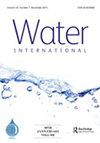Governance in the La Plata River Basin and OECD principles: an opinion survey of transboundary water professionals
IF 1.5
4区 环境科学与生态学
Q3 ENGINEERING, CIVIL
引用次数: 0
Abstract
ABSTRACTThis article analyses how La Plata River Basin experts perceive the process of setting up the governance of transboundary waters and determines whether the principles of good governance are adhered to, as established by the Organization for Economic Co-operation and Development (OECD). A questionnaire was developed and submitted to experts with demonstrated expertise in the field. The results suggest that transboundary water governance needs to be strengthened. Critical issues include principles related to policy coherence and coordination among sectors, integrity and transparency, stakeholder engagement, and balanced commitments between consumers, rural and urban regions, and generations.KEYWORDS: La Plata River Basintransboundary water governanceThe OECD Principles on Water Governancetransboundary water professionalsopinion survey AcknowledgementsThe authors extend their gratitude and acknowledgements to all water professional participants in this study.Disclosure statementNo potential competing interest was reported by the authors.Notes1. The designations employed in this paper and the presentation of material therein do not imply the expression of any opinion whatsoever on the part of UNESCO or the organizations of the authors concerning the legal status of any country, territory, city or area, or of its authorities, or concerning the delimitation of frontiers or boundaries. The ideas and opinions expressed therein are those of the authors and are not those of UNESCO or the organisations of the authors and are not an expression of these organizations’ commitment. All procedures performed in studies involving human participants were in accordance with the ethical standards of the institutional and/or national research committee and with the 1964 Helsinki Declaration and its later amendments or comparable ethical standards. Ethical approval for this study was obtained from Federal University of São Paulo Ethics Committee (Project CEP/UNIFESP no 0932/2020). Informed consent was obtained from all individual participants included in the study.Additional informationFundingThis publication was supported by the National Water and Sanitation Agency of Brazil as part of the ANA-ABC-UNESCO 586RLA2001 project.拉普拉塔河流域的治理与经合组织原则:跨界水务专业人士的意见调查
摘要本文分析了拉普拉塔河流域专家如何看待建立跨界水域治理的过程,以及如何确定是否遵守经济合作与发展组织(OECD)所确立的善治原则。编制了一份调查表,并提交给在该领域显示出专门知识的专家。研究结果表明,跨境水治理有待加强。关键问题包括与部门间政策一致性和协调、诚信和透明度、利益相关者参与以及消费者、农村和城市地区以及代际之间的平衡承诺有关的原则。关键词:拉普拉塔河流域、跨界水治理、经合组织水治理原则、跨界水专业人士意见调查致谢作者对所有参与本研究的水专业人士表示感谢和感谢。披露声明作者未报告潜在的竞争利益。本文件中使用的名称及其材料的介绍并不意味着教科文组织或作者组织对任何国家、领土、城市或地区的法律地位或其当局的法律地位,或对边界或边界的划定表达任何意见。其中所表达的想法和意见是作者的想法和意见,不代表教科文组织或作者所在组织的想法和意见,也不表示这些组织的承诺。在涉及人类参与者的研究中执行的所有程序都符合机构和/或国家研究委员会的道德标准以及1964年《赫尔辛基宣言》及其后来的修正案或类似的道德标准。本研究获得了圣保罗联邦大学伦理委员会(项目CEP/UNIFESP no 0932/2020)的伦理批准。所有参与研究的个体都获得了知情同意。本出版物由巴西国家水和卫生机构作为ANA-ABC-UNESCO 586RLA2001项目的一部分提供支持。
本文章由计算机程序翻译,如有差异,请以英文原文为准。
求助全文
约1分钟内获得全文
求助全文
来源期刊

Water International
工程技术-工程:土木
CiteScore
4.40
自引率
7.70%
发文量
58
审稿时长
6-12 weeks
期刊介绍:
Water International is the official journal of the International Water Resources Association (IWRA), founded in 1972 to serve as an international gateway to the people, ideas and networks that are critical to the sustainable management of water resources around the world. Water International''s articles, state-of-the-art reviews, technical notes and other matter are policy-relevant and aimed at communicating in-depth knowledge to a multidisciplinary and international community. Water International publishes both individual contributions and thematic special issues and sections on cutting edge issues.
All individual manuscript submissions are subject to initial appraisal and peer review by the Deputy Editor in Chief and the Associate Editors, and, if found suitable for further consideration, to peer review by at least one independent, anonymous expert referee. All external peer review is double blind. Thematic issues and sections are handled under comparable procedures by guest editors under the oversight of the Editor in Chief.
 求助内容:
求助内容: 应助结果提醒方式:
应助结果提醒方式:


